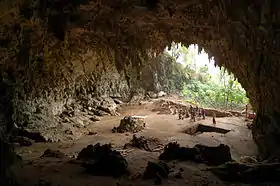Liang Bua
Liang Bua is a limestone cave on the island of Flores, Indonesia. The cave is slightly north of the town of Ruteng in Manggarai Regency, East Nusa Tenggara.
| Liang Bua | |
|---|---|
 Cave where the remains of Homo floresiensis were found | |
| Location | Flores, East Nusa Tenggara, Indonesia |
| Length | 50 meters |
| Discovery | 1950s |
| Geology | Limestone |
| Entrances | 1 |
The cave demonstrated archaeological and paleontological potential in the 1950s and 1960s as described by the Dutch missionary and archaeologist Theodor L. Verhoeven.[1] The cave was the site of a 2003 discovery of a potentially new species of genus Homo, Homo floresiensis, the remains of which are The Indonesian field coordinator of the excavation team, Thomas Sutikna, was preparing to close up the dig at Liang Bua when the first indications of the important fossils were uncovered and later coded LB1, LB2, etc., after the name of the cave.[2] So far it is the only location in which such remains have been identified, although archeological work in the nearby Soa Valley in Ngada Regency appears to support findings from the Liang Bua site.[3]
In 2010 and 2011, archaeologists discovered two hominin teeth in the cave that did not come from Homo floresiensis. According to Sutikna, the teeth date to around 46,000 BP and are likely to have come from Homo sapiens.[4]
In 2013, a 3D model of the cave created via laser scanning was made available online by the Smithsonian Institution.[5]
Disagreement
There is continuing disagreement among scientists as to whether the discoveries represent a new and distinct hominid species.[6] On one hand, some experts on human origin argue that the discoveries represent a distinct species that lived in relatively modern times.[7] Others argue that it is more likely that the bones of the most complete individual found in Liang Bua (individual LB1) are those of a local person who was possibly suffering from a medical condition (perhaps Down Syndrome) rather than a unique species of Homo that lived in Flores.[8]
Palaeofauna
- Homo floresiensis
- Stegodon florensis insularis, dwarfed stegodontid proboscidean
- Papagomys theodorverhoeveni, giant rat
- Papagomys armandvillei, giant rat
- Varanus komodoensis, giant varanid lizard
- Leptoptilos robustus, giant marabou stork
References
- For Verhoeven, see: Knepper, Gert M. (2019): Floresmens - Het leven van Theo Verhoeven, missionaris en archeoloog, ISBN 978-9-46-3892476 (Boekscout, Soest, The Netherlands) (= Verhoeven's biography, in Dutch)
- 'Sutikna traces man's ancestry through Liang Bua find' Archived 2013-12-27 at the Wayback Machine, The Jakarta Post, 17 April 2005.
- ''Hobbits' on Flores', Smithsonian Natural Museum of Natural History, accessed 27 December 2013.
- Callaway, Ewen (2016). "Human remains found in hobbit cave". Nature. doi:10.1038/nature.2016.20656. S2CID 89272546. Retrieved 23 September 2016.
- http://3d.si.edu/explorer?modelid=62&reader=true,
- A summary of the different views, ten years after the publication of the first main research article in Nature, can be found at Richard 'Bert' Roberts and Thomas Sutikna, 'A decade on and the Hobbit still holds secrets', The Conversation, 30 October 2014.
- 'Indonesian 'hobbit' challenges evolutionary theory' Archived 2013-12-27 at the Wayback Machine, The Jakarta Post, 7 March 2010. See also, Michael Casey, '["Hobbit" Skeleton Questions Evolution's Out-Of-Africa Theory'], The Jakarta Globe, 8 March 2010.
- Maciej Henneberg and Robert Eckhardt, '"Hobbit" more likely had Down Syndrome rather than a new species', The Conversation, 5 August 2014. See also the detailed paper by Robert B. Eckhardt, Maciej Henneberg, Alex S. Weller and Kenneth J. Hsu, 'Rare events in early history include the LB1 human skeleton from Flores, Indonesia, as a development singularity, not a unique taxon', Proceedings of the National Academy of Sciences of the United States of America, 4 August 2014.
Further reading
- Brown, P.; Sutikna, T., Morwood, M. J., Soejono, R. P., Jatmiko, Wayhu Saptomo, E. & Rokus Awe Due (October 27, 2004). "A new small-bodied hominin from the Late Pleistocene of Flores, Indonesia.". Nature, 431. doi:10.1038/nature02999.
- Meijer HJM & R A Due (2010). "A new species of giant marabou stork (Aves: Ciconiiformes) from the Pleistocene of Liang Bua, Flores (Indonesia)". Zoological Journal of the Linnean Society. 160 (4): 707–724. doi:10.1111/j.1096-3642.2010.00616.x.
- Morwood, M. J.; Soejono, R. P., Roberts, R. G., Sutikna, T., Turney, C. S. M., Westaway, K. E., Rink, W. J., Zhao, J.- X., van den Bergh, G. D., Rokus Awe Due, Hobbs, D. R., Moore, M. W., Bird, M. I. & Fifield, L. K. (October 27, 2004). "Archaeology and age of a new hominin from Flores in eastern Indonesia.". Nature 431: 1087–1091. doi:10.1038/nature02956.
- Penny Van Oosterzee; Mike Morwood. A New Human: The Startling Discovery and Strange Story of the "Hobbits" of Flores, Indonesia'. London: Collins. ISBN 0-06-089908-5.
- Knepper, Gert M. (2019): Floresmens - Het leven van Theo Verhoeven, missionaris en archeoloog. ISBN 978-9-46-3892476 (Boekscout, Soest, The Netherlands) (= Verhoeven's biography, in Dutch)